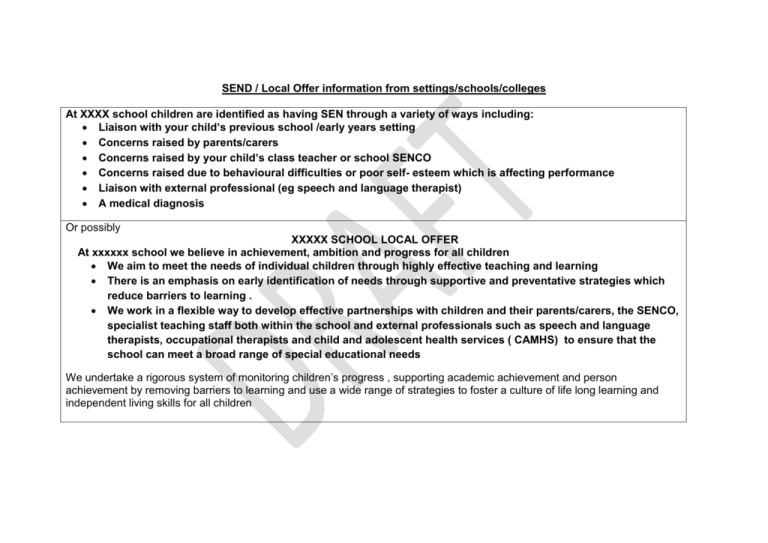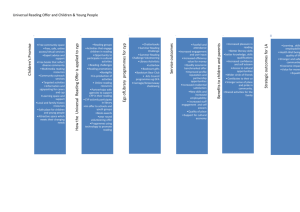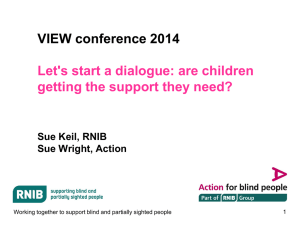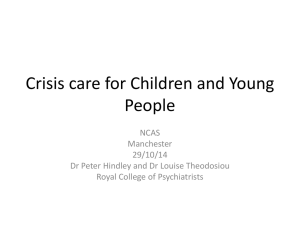SEND / Local Offer information from settings/schools/colleges
advertisement

SEND / Local Offer information from settings/schools/colleges At XXXX school children are identified as having SEN through a variety of ways including: Liaison with your child’s previous school /early years setting Concerns raised by parents/carers Concerns raised by your child’s class teacher or school SENCO Concerns raised due to behavioural difficulties or poor self- esteem which is affecting performance Liaison with external professional (eg speech and language therapist) A medical diagnosis Or possibly XXXXX SCHOOL LOCAL OFFER At xxxxxx school we believe in achievement, ambition and progress for all children We aim to meet the needs of individual children through highly effective teaching and learning There is an emphasis on early identification of needs through supportive and preventative strategies which reduce barriers to learning . We work in a flexible way to develop effective partnerships with children and their parents/carers, the SENCO, specialist teaching staff both within the school and external professionals such as speech and language therapists, occupational therapists and child and adolescent health services ( CAMHS) to ensure that the school can meet a broad range of special educational needs We undertake a rigorous system of monitoring children’s progress , supporting academic achievement and person achievement by removing barriers to learning and use a wide range of strategies to foster a culture of life long learning and independent living skills for all children 1. How do the setting / school / college know if children / young people need extra help ? Guidance: How do you identify children/young people with special educational needs? How will parent/carers be able to raise any concerns they may have? If the setting / school / college is specialist which types of special educational need do you cater for? 2. What should a parent/carer do if they think their child / young person (CYP) may have special educational needs (SEND)? 3. How will early years setting / school / college staff support the CYP who has been identified as having SEND? Guidance: Who will oversee and plan the education programme and who will be working with CYP and how often? What will be their roles? Who will explain this to parent/carers? How are the setting / school / college governors or trustees involved and what are their responsibilities? How do the setting / school / college know how effective its arrangements/provisions are for CYP with SEND? 4. How will the curriculum be matched to CYP who needs extra support or SEND? Guidance: What are the setting’s / school’s / college’s approaches to differentiation? How will that help a CYP who require extra help or SEND? 5. How will both early years setting / school / college and the parent know how the CYP is doing AND how will early years setting / school / college help the parent to support CYP’s learning? Guidance: In addition to the normal reporting arrangements what opportunities will there be for parent/carers to discuss their CYP progress with the staff? How do the setting / school / college know how well the CYP is doing? How will parent/carers know what progress their CYP should be making? What opportunities will there be for regular contact about things that have happened at early years setting / school / college eg a home school book? How will the setting/school/college explain to parent/carers how their CYP’s learning is planned and how the parent/carers can help support this outside of the setting / school / college? How and when will parent/carers be involved in planning their CYP’s education? Do you offer any parent/carer training or learning events? 6. What support is offered from the early years setting / school / college to ensure the well-being of the CYP who requires extra help or SEND? Guidance: What is the pastoral, medical and social support available in the setting / school / college for CYP with SEND? How do the setting / school / college manage the administration of medicines and providing personal care? What support is there for behaviour, avoiding exclusions and increasing attendance? How will the CYP be able to contribute his or her views? How will the setting / school / college support the CYP to do this? 7. What specialist services and expertise are available at or accessed by the setting / school / college? Guidance: Are there specialist staff working at the setting / school / college and what are their qualifications? What other services does the setting / school / college access including health, therapy and social care services? 8. What training are the staff having or going to have to support CYP with SEND? Guidance: This should include recent and future planned training and disability awareness. 9 How will CYP be included in activities outside the classroom including school trips? Guidance: Will CYP who needs extra help or SEND be able to access all of the activities of the setting / school / college and how will the setting / school / college assist him or her to do so? How do the setting / school / college involve parent carers in planning activities and trips? 10.How accessible is the setting / school / college environment? Guidance: Is the building fully wheelchair accessible? Have there been improvements in the auditory and visual environment? Are there disabled changing and toilet facilities? How do the setting / school / college communicate with parent carers whose first language is not English? How will equipment and facilities to support CYP with SEND be secured? 11.How will the setting / school / college prepare and support the CYP who needs extra help or SEND to join the setting / school / college, transfer to a new setting / school / college or the next stage of education and life? Guidance: What preparation will there be for both the setting / school / college and the CYP before he or she joins the setting / school / college? How will he or she be prepared to move onto the next stage? What information will be provided to his or her new setting / school / college? How will you support a new setting / school / college to prepare for the CYP who requires extra help or SEND? 12.How are the setting’s / school’s / college’s resources allocated and matched to CYP’s SEND? Guidance: How is the setting’s / school’s / college’s special educational needs budget allocated? 13.How is the decision made about what type and how much support a CYP with SEND will receive? Guidance: Describe the decision making process. Who will make the decision and on what basis? Who else will be involved? How will parent/carers be involved? How does the setting / school / college judge whether the support has had an impact? Describe the setting’s / school’s / college’s approach to involving parents in decision making and day to day school life including for their own CYP. 14. Who can a parent/carer contact for further information at your early years setting / school / college? Guidance: Who would be the first point of contact if parent/carers want to discuss something about the CYP? Who else has a role in the CYP’s education? Who can parent/carers talk to if they are worried? Who should parent/carers contact if they are considering whether CYP should join the setting / school / college? Who is the SEN Co-ordinator and how can they be contacted? What other support services are there that might help the parent/carers and provide information and advice? Where can parent/carers find the local authority’s Local Offer?








